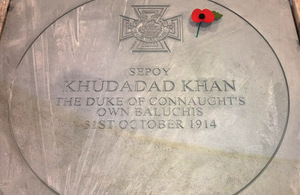Paving stone laid for Pakistani-born First World War hero
Khudadad Khan was awarded a Victoria Cross, Britain’s highest military award for his actions on 31 October 1914 at Hollebeke, Belgium.

Khudadad Khan
A memorial paving stone has been laid today at the National Memorial Arboretum in Staffordshire in honour of Khudadad Khan, the first South Asian and first Muslim recipient of the Victoria Cross (VC) during the First World War.
The paving stone is being laid alongside 144 others to recognise all overseas born First World War VC recipients as part of the Government’s First World War Centenary commemorations.
Khudadad Khan was awarded a Victoria Cross, Britain’s highest military award for his actions on 31 October 1914 at Hollebeke, Belgium.
Sepoy Khan and his detachment were subjected to heavy gun fire as they attempted to defend their position. Facing overwhelming opposition Khudadad Khan’s team was overrun.
All the men were killed except Khudadad Khan, who despite being badly wounded, continued firing. He was left for dead by the enemy but despite his wounds, he managed to crawl back to his regiment during the night to continue fighting.
Communities Secretary Eric Pickles said:
The First World War was a truly global war, and one which pulled in people from every corner of the earth. People from every background united in their shared values.
Khudadad Khan displayed immense fortitude by continuing to fight when all around him were lost and despite terrible injuries, dragging himself back to his comrades, his friends, to continue to give his all in the fight for liberty.
The stone that will lay in the National Memorial Arboretum for Sepoy Khan is a small token of our gratitude and a recognition of all of our shared history. I hope that for many years to come it will remind us all of the gallantry of the brave men who fought for Britain and their role in the history of the First World War.
In August 2013 Communities Secretary Eric Pickles announced a nationwide campaign to honour those who received the VC, Britain’s highest military honour, during the First World War. As part of this, over the next 4 years on the date corresponding to when they were awarded the VC, commemorative paving stones will be laid in their place of birth or where they lived following the war.
469 stones will be laid in communities in England, Wales, Scotland and Northern Ireland. 35 VC recipients will be commemorated in the Republic of Ireland.
However, the British War effort was made up of peoples who encompassed every corner of the globe and 145 VC’s were awarded to those born overseas.
These heroes will be commemorated by the unveiling of 145 stones at the National Memorial Arboretum on 5 March. The Foreign and Commonwealth Office will also place commemorative plaques in countries around the world for men from overseas who received the Victoria Cross, for service in the First World War.
A special ceremony was held at the British Library on 31 October 2014 to mark 100 years to the day that Khudadad Khan was awarded the VC.
Biography
Khudadad Khan was born 20 October 1888*. He was born in the in the village of Dab in the Chakwal district of present day Pakistan and belonged to the famous Rajput tribe of Punjab.
He was awarded his VC when he was a 26 year old Sepoy in the 129th Duke of Counaught’s Own Baluchis – part of the pre-partition Indian Army. Sepoy Khudadad Khan recovered from his wounds in an English hospital, and three months later was decorated by King George V at Buckingham Palace
Khudadad Khan returned to India, and continued to serve in the Indian Army. In 1971 he died at home in Pakistan, aged 84.
**There is some debate as to birthdate as some documentation indicate this may be 26 October 1888.
Further information
4 Servicemen born in what is today Pakistan were awarded the Victoria Cross during the First World War.
The first Victoria Cross Paving stones were laid on 23 August 2014 to mark exactly 100 years to the day that the first Victoria Crosses were awarded during the First World War. The last stones will be laid in November 2018.
A public competition was held to choose a design for the paving stones and this was judged by a panel of 7 experts. The competition was won by Charlie MacKeith from London whose winning design will feature on all the paving stones that will be laid in communities across the country. The circular design seeks to ‘make one pause and remember’ and uses the material, form and lettering of the family of memorials used by the War Graves Commission.
The paving stones are made of Scoutmoor Yorkstone a hard-wearing British stone that is quarried near Ramsbottom. Each stone will include the name of the individual, the rank and regiment of the individual (at the time the VC was awarded) and the date of the action for which the VC was awarded.
Follow the laying of the commemorative stones on Twitter #VCpavingstones, and on Pinterest.
For more information please contact Rhod Jones, Rhodri.Jones@Communities.gsi.gov.uk 0303 444 1143/07967 788743 or Patrick.Coyne@communities.gov.uk 030 3444 4326